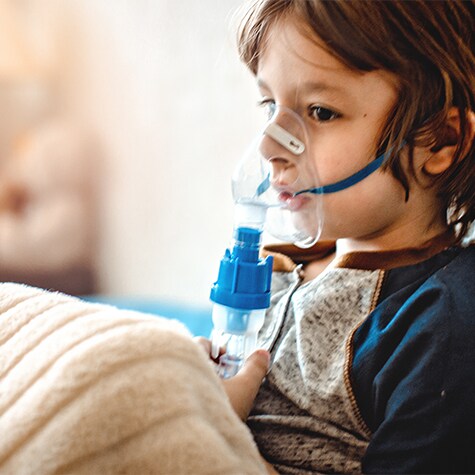A 5-Part Plan for Controlling Your Child’s Asthma
Managing your child’s asthma can feel overwhelming, but in partnership with your child’s doctor, school nurse and family, you can help your child with asthma live a happy, healthy and active life.
Doctors say these are the key indicators that you’re managing your child’s asthma:
- Activity (sports, going to school, outdoor play) doesn’t need to be limited because of asthma.
- Rescue medications are only needed 1-2 times per week or less.
- Nighttime symptoms (cough, difficulty breathing) occur 1-2 times per month or less.
- Visits to the emergency department or courses of oral steroids are needed less than twice a year.

“I typically see a child who has asthma a few times a year, but their parents see them every day,” says Matthew Hazen, MD, a Pulmonologist at Children's Healthcare of Atlanta. “Parents have tremendous power to notice their child’s asthma signs, symptoms and triggers. A child with asthma gets the best care when their parents, doctors and care providers work together as a team.”
How can I help manage my child’s asthma symptoms?
As a parent, you can make the biggest difference by doing these five things:
1. Stay on top of your child’s asthma medications.
Make sure that you (or your child, depending on his age and how responsible he tends to be) always have a rescue inhaler and that it always has enough medicine ready to go in case of emergency. Involve your child in this process, no matter his age, so your child can begin to understand that the medicine is helping.
If your doctor has prescribed daily or twice-daily long-term medicine for your child, make sure he takes it on time and uses a spacer. Be sure to keep up with refills so you have all the supplies you need on hand.
2. Avoid common asthma triggers in the home.
Focus on removing allergens that can trigger asthma, especially dust. Avoid problems with dust by using mattress and pillow covers, changing your HVAC filters at least every three to four months, and vacuuming and dusting your home once a week. Look for evidence of mold in the home, especially in the bathroom and kitchen.
3. Take steps to avoid colds and the flu.
Viral illness is the most common cause of asthma flare ups in children. Help your child get in the habit of washing their hands well and frequently. Avoid contact with people who are sick. And be sure to get your annual flu shot, too.
4. Monitor your child’s asthma.
Look for the triggers that cause asthma flare-ups and take steps to avoid them. If you see a change in the frequency or severity of your child’s asthma symptoms, make sure to call your doctor to discuss it.
5. Partner with your child’s doctor.
See your child’s primary care physician or pulmonary specialist regularly to have your child’s asthma and medications evaluated and updated. Be sure to talk to your child’s doctor about:
- How asthma affects your child’s life
- The signs of uncontrolled asthma
- Problems taking medicine, including any side effects you’re noticing
- Any recent emergency department or hospital visits
- Related health issues that may aggravate your child’s asthma, including sinus problems or weight gain
- Creation of an Asthma Action Plan that can be shared with school, day care, and any friends or relatives that help care for your child.
Be honest with your child about asthma. Remember, as your child grows, independence is an important goal. Children with asthma don’t want to be different, yet they need guidance and supervision.
- Toddlers: This age group relies completely on the parents. Young children understand little about asthma. Try to make medication time fun while explaining how important it is to take the medicine. Let your child help in any way possible.
- School-age: Older children are ready to understand asthma better. Explain their medications, how to avoid their triggers and how to start to monitor their own symptoms.
- Teens: Teens often resist taking chronic medications, don’t like restrictions and don’t want to be different. Make sure to involve them in every aspect of asthma management, both at home and at the doctor's office. They should help set goals and decide which medications work best. Consider making an asthma care “contract” together. This should provide a framework for self-care with parental supervision. Help them understand that having asthma doesn’t mean having less fun than other teens. It is important for your teen to tell his friends about the triggers that make his asthma worse.
While asthma is a chronic disease that can last a lifetime, you don’t have to let it be in charge of your child. If you take it step by step, you’ll find that you worry less and—most importantly of all—that your child can feel better.

Tips to help manage flare-ups
By responding quickly to an asthma flare-up, you can often stop it or make it less severe.
Learn HowMatthew Hazen, MD, is a board-certified Pediatric Pulmonologist at Children’s Healthcare of Atlanta and serves as the Associate Director of the Cystic Fibrosis Program. His areas of interest include asthma, chronic respiratory failure, cystic fibrosis, and newborn pulmonary diseases.
This content is general information and is not specific medical advice. Always consult with a doctor or healthcare provider if you have any questions or concerns about the health of a child. In case of an urgent concern or emergency, call 911 or go to the nearest emergency department right away. Some physicians and affiliated healthcare professionals on the Children’s Healthcare of Atlanta team are independent providers and are not our employees.
Contact Us 404-785-KIDS (5437)